Deck 15: Global Soils
Question
Question
Question
Question
Question
Question
Question
Question
Question
Question
Question
Question
Question
Question
Question
Question
Question
Question
Question
Question
Question
Question
Question
Question
Question
Question
Question
Question
Question
Question
Question
Question
Question
Question
Question
Question
Question
Question
Question
Question
Question
Question
Question
Question
Question
Question
Question
Question
Question
Question
Question
Question
Question
Question
Question
Question
Question
Question
Question
Question
Question
Question
Question
Question
Question
Question
Question
Question
Question
Question
Question
Question
Question
Question
Question
Question
Question
Question
Question
Question

Unlock Deck
Sign up to unlock the cards in this deck!
Unlock Deck
Unlock Deck
1/137
Play
Full screen (f)
Deck 15: Global Soils
1
The finely divided, partially decomposed organic matter in the soil is called:
A)humus
B)bedrock
C)caliche
D)till
A)humus
B)bedrock
C)caliche
D)till
A
2
The natural, terrestrial surface layer containing living matter and supporting, or capable of supporting, crops is BEST called:
A)biosphere
B)bedrock
C)ground water
D)soil
A)biosphere
B)bedrock
C)ground water
D)soil
D
3
The descriptive property of the mineral portion of soil based on varying proportions of sand, silt, and clay is the soil:
A)structure
B)texture
C)chemistry
D)profile
A)structure
B)texture
C)chemistry
D)profile
B
4
Angular or blocky describes a soil's:
A)texture
B)profile
C)chemistry
D)structure
A)texture
B)profile
C)chemistry
D)structure

Unlock Deck
Unlock for access to all 137 flashcards in this deck.
Unlock Deck
k this deck
5
A high humus content makes soil appear:
A)red
B)black
C)yellow
D)gray
A)red
B)black
C)yellow
D)gray

Unlock Deck
Unlock for access to all 137 flashcards in this deck.
Unlock Deck
k this deck
6
The clumping of soil grains is the soil's:
A)profile
B)texture
C)chemistry
D)structure
A)profile
B)texture
C)chemistry
D)structure

Unlock Deck
Unlock for access to all 137 flashcards in this deck.
Unlock Deck
k this deck
7
Positively charged plant nutrient ions are called:
A)loams
B)bases
C)horizons
D)silts
A)loams
B)bases
C)horizons
D)silts

Unlock Deck
Unlock for access to all 137 flashcards in this deck.
Unlock Deck
k this deck
8
Broken bedrock is called:
A)laccolith
B)batholith
C)cocolith
D)regolith
A)laccolith
B)batholith
C)cocolith
D)regolith

Unlock Deck
Unlock for access to all 137 flashcards in this deck.
Unlock Deck
k this deck
9
The inorganic material base from which soil forms is called:
A)horizons
B)ultisol
C)parent material
D)drift
A)horizons
B)ultisol
C)parent material
D)drift

Unlock Deck
Unlock for access to all 137 flashcards in this deck.
Unlock Deck
k this deck
10
The soils of boreal forests are typically:
A)yellow
B)black
C)gray
D)orange
A)yellow
B)black
C)gray
D)orange

Unlock Deck
Unlock for access to all 137 flashcards in this deck.
Unlock Deck
k this deck
11
The key factor in determining how the soils of a region support vegetation and crops is the:
A)sandy texture
B)iron content
C)depth of the B horizon
D)soil moisture
A)sandy texture
B)iron content
C)depth of the B horizon
D)soil moisture

Unlock Deck
Unlock for access to all 137 flashcards in this deck.
Unlock Deck
k this deck
12
The colors of soils in dry climates are frequently:
A)blue
B)black
C)gray
D)white
A)blue
B)black
C)gray
D)white

Unlock Deck
Unlock for access to all 137 flashcards in this deck.
Unlock Deck
k this deck
13
Soil texture is important because it influences the:
A)age
B)moisture-holding capacity
C)color
D)acidity or alkalinity
A)age
B)moisture-holding capacity
C)color
D)acidity or alkalinity

Unlock Deck
Unlock for access to all 137 flashcards in this deck.
Unlock Deck
k this deck
14
Red soils are usually high in:
A)iron
B)humus
C)calcium carbonate
D)salt
A)iron
B)humus
C)calcium carbonate
D)salt

Unlock Deck
Unlock for access to all 137 flashcards in this deck.
Unlock Deck
k this deck
15
A mixture of particle sizes is called:
A)loam
B)sand
C)clay
D)silt
A)loam
B)sand
C)clay
D)silt

Unlock Deck
Unlock for access to all 137 flashcards in this deck.
Unlock Deck
k this deck
16
Soil acidity can be reduced by treating with:
A)lime
B)quartz
C)carbon
D)hydrogen or aluminum
A)lime
B)quartz
C)carbon
D)hydrogen or aluminum

Unlock Deck
Unlock for access to all 137 flashcards in this deck.
Unlock Deck
k this deck
17
The finest soil particle sizes are called:
A)peds
B)sand
C)colloids
D)silt
A)peds
B)sand
C)colloids
D)silt

Unlock Deck
Unlock for access to all 137 flashcards in this deck.
Unlock Deck
k this deck
18
Extremely small mineral or organic particles that can remain indefinitely suspended in water are:
A)silt
B)sand
C)colloids
D)loam
A)silt
B)sand
C)colloids
D)loam

Unlock Deck
Unlock for access to all 137 flashcards in this deck.
Unlock Deck
k this deck
19
Lumps of soil are called:
A)peds
B)lopoliths
C)ventifacts
D)geodes
A)peds
B)lopoliths
C)ventifacts
D)geodes

Unlock Deck
Unlock for access to all 137 flashcards in this deck.
Unlock Deck
k this deck
20
The loss of moisture to the atmosphere from the soil and from plants is called:
A)oxidation
B)podzolization
C)evapotranspiration
D)liquefaction
A)oxidation
B)podzolization
C)evapotranspiration
D)liquefaction

Unlock Deck
Unlock for access to all 137 flashcards in this deck.
Unlock Deck
k this deck
21
The process of accumulating materials from above is called:
A)eluviation
B)liquefaction
C)transformation
D)illuviation
A)eluviation
B)liquefaction
C)transformation
D)illuviation

Unlock Deck
Unlock for access to all 137 flashcards in this deck.
Unlock Deck
k this deck
22
The layer of the soil that receives the clay particles, aluminum, and iron oxides and some organic matter is the:
A)A
B)B
C)C
D)E
A)A
B)B
C)C
D)E

Unlock Deck
Unlock for access to all 137 flashcards in this deck.
Unlock Deck
k this deck
23
The upward wicking of salt-laden groundwater is called:
A)saltation
B)leaching
C)calcification
D)salinization
A)saltation
B)leaching
C)calcification
D)salinization

Unlock Deck
Unlock for access to all 137 flashcards in this deck.
Unlock Deck
k this deck
24
The build-up of calcium carbonate in the soil is called:
A)carbonation
B)leaching
C)calcification
D)decalcification
A)carbonation
B)leaching
C)calcification
D)decalcification

Unlock Deck
Unlock for access to all 137 flashcards in this deck.
Unlock Deck
k this deck
25
Adding organic and inorganic matter to the soil is:
A)transformation
B)removal
C)eluviation
D)soil enrichment
A)transformation
B)removal
C)eluviation
D)soil enrichment

Unlock Deck
Unlock for access to all 137 flashcards in this deck.
Unlock Deck
k this deck
26
The soil layers from the surface down on a well-developed and undisturbed soil are:
A)O, A, E, B, C
B)A, B, C, E, O
C)A, B, O, C, E
D)O, A, B, E, C
A)O, A, E, B, C
B)A, B, C, E, O
C)A, B, O, C, E
D)O, A, B, E, C

Unlock Deck
Unlock for access to all 137 flashcards in this deck.
Unlock Deck
k this deck
27
The process of water dissolving and carrying the material downward through the soil layers is called:
A)leaching
B)liquefaction
C)saltation
D)traction
A)leaching
B)liquefaction
C)saltation
D)traction

Unlock Deck
Unlock for access to all 137 flashcards in this deck.
Unlock Deck
k this deck
28
Decomposing organic matter that remains recognizable is the soil layer called:
A)A
B)Oₐ
C)Oᵢ
D)E
A)A
B)Oₐ
C)Oᵢ
D)E

Unlock Deck
Unlock for access to all 137 flashcards in this deck.
Unlock Deck
k this deck
29
The water storage level below which is insufficient for plants is the:
A)wilting point
B)break-in-bulk point
C)recharge
D)dew point
A)wilting point
B)break-in-bulk point
C)recharge
D)dew point

Unlock Deck
Unlock for access to all 137 flashcards in this deck.
Unlock Deck
k this deck
30
A display of soil layers on the face of a freshly cut vertical exposure through the soil is called a(n):
A)texture triangle
B)soil horizon
C)climograph
D)soil profile
A)texture triangle
B)soil horizon
C)climograph
D)soil profile

Unlock Deck
Unlock for access to all 137 flashcards in this deck.
Unlock Deck
k this deck
31
The amount of water a soil can hold against the pull of gravity is its:
A)permeability
B)soil-water balance
C)wilting point
D)storage capacity
A)permeability
B)soil-water balance
C)wilting point
D)storage capacity

Unlock Deck
Unlock for access to all 137 flashcards in this deck.
Unlock Deck
k this deck
32
Water is held to soil particles against the pull of gravity by:
A)magnetism
B)Coriolis effect
C)capillary tension
D)density currents
A)magnetism
B)Coriolis effect
C)capillary tension
D)density currents

Unlock Deck
Unlock for access to all 137 flashcards in this deck.
Unlock Deck
k this deck
33
A graph that shows monthly values of soil moisture gain, loss, and storage is a(n):
A)soil-water budget
B)texture triangle
C)climograph
D)soil profile
A)soil-water budget
B)texture triangle
C)climograph
D)soil profile

Unlock Deck
Unlock for access to all 137 flashcards in this deck.
Unlock Deck
k this deck
34
Distinctive layers of soil, roughly horizontal, set apart from other layers by differences in physical or chemical composition are called:
A)soil structure
B)soil horizons
C)peds
D)soil texture
A)soil structure
B)soil horizons
C)peds
D)soil texture

Unlock Deck
Unlock for access to all 137 flashcards in this deck.
Unlock Deck
k this deck
35
The movement of material upward or downward in the soil is called:
A)emigration
B)translocation
C)mitigation
D)saltation
A)emigration
B)translocation
C)mitigation
D)saltation

Unlock Deck
Unlock for access to all 137 flashcards in this deck.
Unlock Deck
k this deck
36
The downward transport of fine particles carrying them out of the upper soil layers is:
A)illuviation
B)soil enrichment
C)transformation
D)eluviation
A)illuviation
B)soil enrichment
C)transformation
D)eluviation

Unlock Deck
Unlock for access to all 137 flashcards in this deck.
Unlock Deck
k this deck
37
Weathered parent material is the layer called:
A)A
B)B
C)C
D)E
A)A
B)B
C)C
D)E

Unlock Deck
Unlock for access to all 137 flashcards in this deck.
Unlock Deck
k this deck
38
The soil layer rich in both mineral and organic matter is the:
A)A
B)B
C)C
D)O
A)A
B)B
C)C
D)O

Unlock Deck
Unlock for access to all 137 flashcards in this deck.
Unlock Deck
k this deck
39
The uppermost layer on a well-developed and undisturbed soil is the:
A)A
B)Oₐ
C)Oᵢ
D)E
A)A
B)Oₐ
C)Oᵢ
D)E

Unlock Deck
Unlock for access to all 137 flashcards in this deck.
Unlock Deck
k this deck
40
The layer of the soil that loses the clay particles and oxides of aluminum and iron is the:
A)A
B)E
C)C
D)O
A)A
B)E
C)C
D)O

Unlock Deck
Unlock for access to all 137 flashcards in this deck.
Unlock Deck
k this deck
41
A black soil that is high in clay content, associated with savannas, and noted for its wet and dry climate is the:
A)alfisol
B)histosols
C)entisols
D)vertisols
A)alfisol
B)histosols
C)entisols
D)vertisols

Unlock Deck
Unlock for access to all 137 flashcards in this deck.
Unlock Deck
k this deck
42
Low latitude soils are all of the following EXCEPT:
A)alfisols
B)ultisols
C)oxisols
D)vertisols
A)alfisols
B)ultisols
C)oxisols
D)vertisols

Unlock Deck
Unlock for access to all 137 flashcards in this deck.
Unlock Deck
k this deck
43
The soil associated with clay minerals as the parent material that is associated with mud cracks is:
A)mollisols
B)spodosols
C)inceptisols
D)vertisols
A)mollisols
B)spodosols
C)inceptisols
D)vertisols

Unlock Deck
Unlock for access to all 137 flashcards in this deck.
Unlock Deck
k this deck
44
Decomposition of organic matter to humus is called:
A)saltation
B)humification
C)podzolization
D)illuviation
A)saltation
B)humification
C)podzolization
D)illuviation

Unlock Deck
Unlock for access to all 137 flashcards in this deck.
Unlock Deck
k this deck
45
The soil of the cold, boreal, or needleleaf forests is the:
A)mollisols
B)ultisols
C)oxisols
D)spodosols
A)mollisols
B)ultisols
C)oxisols
D)spodosols

Unlock Deck
Unlock for access to all 137 flashcards in this deck.
Unlock Deck
k this deck
46
Cultivation that involves clearing land, growing crops, and moving on a few years later to newly cleared land when the fertility has decreased is called:
A)paddy farming
B)slash-and-burn
C)market gardening
D)plantation agriculture
A)paddy farming
B)slash-and-burn
C)market gardening
D)plantation agriculture

Unlock Deck
Unlock for access to all 137 flashcards in this deck.
Unlock Deck
k this deck
47
The alteration of material within soil layers is called:
A)removal
B)metamorphism
C)transformation
D)inversion
A)removal
B)metamorphism
C)transformation
D)inversion

Unlock Deck
Unlock for access to all 137 flashcards in this deck.
Unlock Deck
k this deck
48
Accumulation in a lower soil layer of materials brought down from upper layers is:
A)illuviation
B)liquefaction
C)saltation
D)eluviation
A)illuviation
B)liquefaction
C)saltation
D)eluviation

Unlock Deck
Unlock for access to all 137 flashcards in this deck.
Unlock Deck
k this deck
49
Soil orders are grouped by:
A)their fertility
B)their color
C)level of horizon development and humus content
D)thickness of the A horizon and latitude
A)their fertility
B)their color
C)level of horizon development and humus content
D)thickness of the A horizon and latitude

Unlock Deck
Unlock for access to all 137 flashcards in this deck.
Unlock Deck
k this deck
50
The fertile soil characterized by a clay-rich horizon produced by illuviation and noted for a wide distribution is:
A)andisol
B)histosol
C)oxisol
D)alfisol
A)andisol
B)histosol
C)oxisol
D)alfisol

Unlock Deck
Unlock for access to all 137 flashcards in this deck.
Unlock Deck
k this deck
51
The number of soil orders used in the United States Soil Conservation System as presented in this text is:
A)5
B)10
C)11
D)14
A)5
B)10
C)11
D)14

Unlock Deck
Unlock for access to all 137 flashcards in this deck.
Unlock Deck
k this deck
52
The process that affected the ancient Sumerian civilization was:
A)salinization
B)laterization
C)calcification
D)podzolization
A)salinization
B)laterization
C)calcification
D)podzolization

Unlock Deck
Unlock for access to all 137 flashcards in this deck.
Unlock Deck
k this deck
53
The reddish to yellowish soils that have a subsurface clay horizon, a low base status, and are typical of the southeastern United States are:
A)ultisols
B)oxisols
C)entisols
D)alfisols
A)ultisols
B)oxisols
C)entisols
D)alfisols

Unlock Deck
Unlock for access to all 137 flashcards in this deck.
Unlock Deck
k this deck
54
Soils that naturally are poor in fertility and able to sustain crops for only several years are:
A)mollisols and alfisols
B)alfisols and aridisols
C)oxisols and ultisols
D)mollisols and histosols
A)mollisols and alfisols
B)alfisols and aridisols
C)oxisols and ultisols
D)mollisols and histosols

Unlock Deck
Unlock for access to all 137 flashcards in this deck.
Unlock Deck
k this deck
55
The soil that develops in moist, equatorial, tropical, and subtropical zones under long stable conditions is:
A)entisols
B)mollisols
C)histosols
D)oxisols
A)entisols
B)mollisols
C)histosols
D)oxisols

Unlock Deck
Unlock for access to all 137 flashcards in this deck.
Unlock Deck
k this deck
56
The soil in which minerals are weathered to an extreme degree, with the color red, yellow, or yellow-brown, and that has a low base status is:
A)spodosol
B)oxisol
C)mollisol
D)histosol
A)spodosol
B)oxisol
C)mollisol
D)histosol

Unlock Deck
Unlock for access to all 137 flashcards in this deck.
Unlock Deck
k this deck
57
The temperature at which most root growth and germination begins is:
A)0ºC
B)5ºC
C)10ºC
D)15ºC
A)0ºC
B)5ºC
C)10ºC
D)15ºC

Unlock Deck
Unlock for access to all 137 flashcards in this deck.
Unlock Deck
k this deck
58
The soils BEST associated with tropical rainforest areas such as the Amazon basin and the wet-dry tropical climate area are:
A)andisols
B)oxisols
C)inceptisols
D)mollisols
A)andisols
B)oxisols
C)inceptisols
D)mollisols

Unlock Deck
Unlock for access to all 137 flashcards in this deck.
Unlock Deck
k this deck
59
Soils with well-developed horizons include:
A)andisols
B)entisols
C)inceptisols
D)spodosols
A)andisols
B)entisols
C)inceptisols
D)spodosols

Unlock Deck
Unlock for access to all 137 flashcards in this deck.
Unlock Deck
k this deck
60
The soil that is strongly acidic and low in plant nutrients and humus, with a pale gray to white E horizon is the:
A)mollisols
B)histosols
C)spodosols
D)vertisols
A)mollisols
B)histosols
C)spodosols
D)vertisols

Unlock Deck
Unlock for access to all 137 flashcards in this deck.
Unlock Deck
k this deck
61
On the illustration, the letter that represents the large clay-sized particles is: 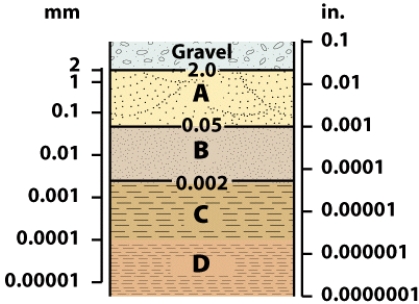
A)A
B)B
C)C
D)D

A)A
B)B
C)C
D)D

Unlock Deck
Unlock for access to all 137 flashcards in this deck.
Unlock Deck
k this deck
62
The soil order occurring in isolated areas with a very high organic content is the:
A)aridisol
B)histosol
C)mollisol
D)inceptisol
A)aridisol
B)histosol
C)mollisol
D)inceptisol

Unlock Deck
Unlock for access to all 137 flashcards in this deck.
Unlock Deck
k this deck
63
The soils with weakly developed horizons are the:
A)entisols
B)inceptisols
C)mollisols
D)oxisols
A)entisols
B)inceptisols
C)mollisols
D)oxisols

Unlock Deck
Unlock for access to all 137 flashcards in this deck.
Unlock Deck
k this deck
64
When more than half of the parent material is volcanic ash, the soil is a(n):
A)andisol
B)alfisol
C)histosol
D)aridisol
A)andisol
B)alfisol
C)histosol
D)aridisol

Unlock Deck
Unlock for access to all 137 flashcards in this deck.
Unlock Deck
k this deck
65
On the illustration, the soil at F is: 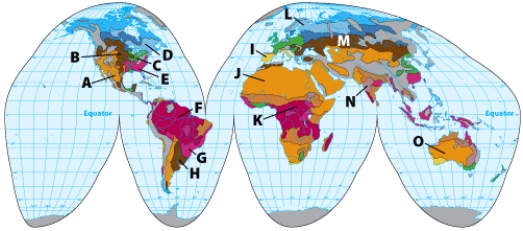
A)ultisol
B)mollisol
C)oxisol
D)aridisol

A)ultisol
B)mollisol
C)oxisol
D)aridisol

Unlock Deck
Unlock for access to all 137 flashcards in this deck.
Unlock Deck
k this deck
66
Organic soils composed of fine black material of sticky consistency formed in former glacial lakebeds are called:
A)muck
B)ventifact
C)caliche
D)epiphyte
A)muck
B)ventifact
C)caliche
D)epiphyte

Unlock Deck
Unlock for access to all 137 flashcards in this deck.
Unlock Deck
k this deck
67
On the illustration, the soil at C is: 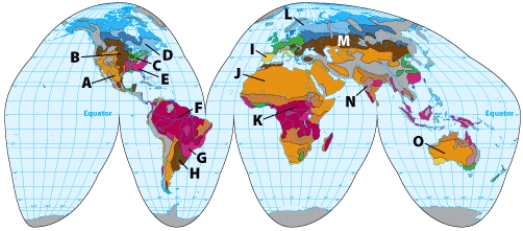
A)alfisol
B)spodosol
C)ultisol
D)inceptisol

A)alfisol
B)spodosol
C)ultisol
D)inceptisol

Unlock Deck
Unlock for access to all 137 flashcards in this deck.
Unlock Deck
k this deck
68
On the illustration, the soil at D is: 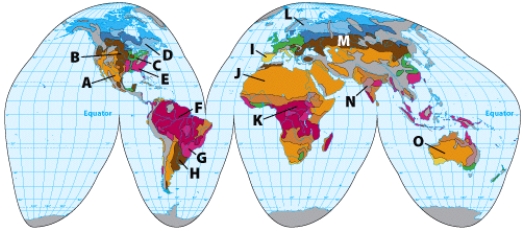
A)ultisol
B)tundra
C)mollisol
D)spodosol

A)ultisol
B)tundra
C)mollisol
D)spodosol

Unlock Deck
Unlock for access to all 137 flashcards in this deck.
Unlock Deck
k this deck
69
On the illustration, the soil at E is: 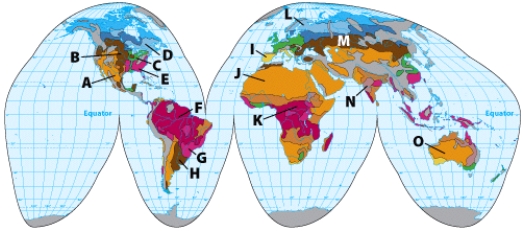
A)alfisol
B)ultisol
C)oxisol
D)mollisol

A)alfisol
B)ultisol
C)oxisol
D)mollisol

Unlock Deck
Unlock for access to all 137 flashcards in this deck.
Unlock Deck
k this deck
70
On the illustration, the letter that represents colloid-sized particles is: 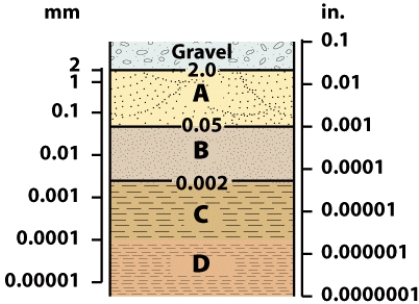
A)A
B)B
C)C
D)D

A)A
B)B
C)C
D)D

Unlock Deck
Unlock for access to all 137 flashcards in this deck.
Unlock Deck
k this deck
71
The soils associated with low humus content, high salts, and long dry periods are:
A)andisols
B)aridisols
C)mollisols
D)entisols
A)andisols
B)aridisols
C)mollisols
D)entisols

Unlock Deck
Unlock for access to all 137 flashcards in this deck.
Unlock Deck
k this deck
72
The soils associated with grasslands of the mid-latitudes are:
A)ultisols
B)inceptisols
C)mollisols
D)spodosols
A)ultisols
B)inceptisols
C)mollisols
D)spodosols

Unlock Deck
Unlock for access to all 137 flashcards in this deck.
Unlock Deck
k this deck
73
Permanently frozen ground is called:
A)muck
B)peat
C)permafrost
D)gellisol
A)muck
B)peat
C)permafrost
D)gellisol

Unlock Deck
Unlock for access to all 137 flashcards in this deck.
Unlock Deck
k this deck
74
Soil horizons may be missing because:
A)the parent material is stable
B)they have been eroded away
C)the material has recently been deposited
D)of ALL of these
A)the parent material is stable
B)they have been eroded away
C)the material has recently been deposited
D)of ALL of these

Unlock Deck
Unlock for access to all 137 flashcards in this deck.
Unlock Deck
k this deck
75
The fertility of the soilwater solution for plants is based on the ability of the soil to hold and exchange cations, which is called:
A)Colloids
B)Muck
C)Cation-exchange capacity
D)base cations
A)Colloids
B)Muck
C)Cation-exchange capacity
D)base cations

Unlock Deck
Unlock for access to all 137 flashcards in this deck.
Unlock Deck
k this deck
76
On the illustration, the letter that represents silt-sized particles is: 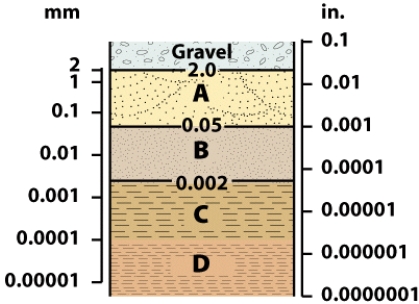
A)A
B)B
C)C
D)D

A)A
B)B
C)C
D)D

Unlock Deck
Unlock for access to all 137 flashcards in this deck.
Unlock Deck
k this deck
77
The soil type without horizon development is the:
A)mollisols
B)spodosols
C)ultisols
D)entisols
A)mollisols
B)spodosols
C)ultisols
D)entisols

Unlock Deck
Unlock for access to all 137 flashcards in this deck.
Unlock Deck
k this deck
78
On the illustration, the soil at B is: 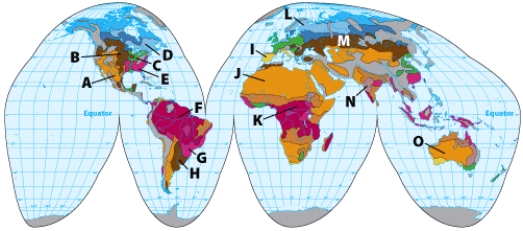
A)aridisol
B)ultisol
C)mollisol
D)alfisol

A)aridisol
B)ultisol
C)mollisol
D)alfisol

Unlock Deck
Unlock for access to all 137 flashcards in this deck.
Unlock Deck
k this deck
79
On the illustration, the soil at A is: 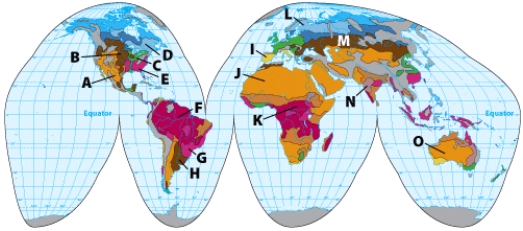
A)aridisol
B)mollisol
C)oxisol
D)ultisol

A)aridisol
B)mollisol
C)oxisol
D)ultisol

Unlock Deck
Unlock for access to all 137 flashcards in this deck.
Unlock Deck
k this deck
80
On the illustration, the letter that represents sand-sized particles is: 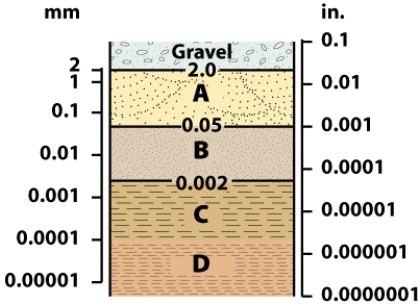
A)A
B)B
C)C
D)D

A)A
B)B
C)C
D)D

Unlock Deck
Unlock for access to all 137 flashcards in this deck.
Unlock Deck
k this deck


